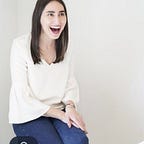Can a Podcast Change the World?
I’m on the verge of creating something big.
I have the project all planned out, but putting it into production is proving to be harder than it seems.
After many meetings and brainstorm sessions, I finished my first semester of graduate school by submitting a 3500 word thesis proposal to my supervisor. Now, I’ll be dedicating the remainder of my one-year Master’s program to bringing my project, a podcast talk show co-produced with persons with disabilities, to life.
Some (much-needed) time away from the stresses of schoolwork and production planning over the holidays has allowed me to think about my project on a larger scale:
Why do I want my thesis project to be a vehicle for change? What impact can my podcast have in the long run?
Deciding to make a podcast came quite naturally thanks to an enjoyable practice project in class and a growing interest in shows such as Modern Love and Death, Sex & Money, both of which offer a variety of compelling stories from people with different backgrounds and perspectives. However, finding the main subject to feature in my production was far more challenging.
Early in the semester, I taped several multi-colored pieces of construction paper to my apartment walls, with an issue close to my heart written on each sheet. I considered the prevalence of mental illness among my generation, the everyday inequality between men and women and the growing allegations of sexual assault. I taped sheet after sheet of paper to my wall only to realize that the perfect topic was the one that hits closest to home.
Like many older sisters, I worry too much about my brother. On top of the standard sibling concerns, I read into how others perceive him more than I probably should, since one of us can see what the other does not. I wonder why some able-bodied people look so visibly uptight around him, whether it’s a stranger staring at his white cane, or an acquaintance of his he wants to see outside of school. While conducting research for my literature review last December, I discovered some of the long-standing social stereotypes that have implicitly fuelled our interactions with persons with disabilities, for example, assuming someone with a disability is unable to function independently.
Unfortunately, many of these stereotypes have been implemented in the media: for example, some may notice the problem of constantly awarding able-bodied actors who contort themselves to portray a physical disability on screen. However, sometimes the stereotypical disparities between persons with or without disabilities are promoted unintentionally. On podcasts like The Accessible Stall, we hear two persons with disabilities using their platform to advocate for widespread accessibility, with the hosts conveying their perspectives by sharing how they navigate an able-bodied world. I commend works like these because I believe these hosts’ stories need to be shared, but I also think it’s problematic for them to label themselves the “other.”
In light of this, could a podcast like mine, which aims to center on conversations about the varying experiences of young adults rather than advocacy, be similarly impactful?
This semester, I enrolled in a class called Social Justice Media to delve deeper into the representations of disabilities in media but also to learn about other examples of inspiring activist media projects. I am in the second semester of my short Media Production program, and while I had the choice of several electives, I chose this one because I knew it would inform my growing project. Over the course of the semester, we will learn how different activist movements are represented through various media, from abstract photography involving migrant workers to my core subject of representations of disability in film, television, and audio productions.
During our second week of class, we studied the work of activist artist Tania Bruguera. We watched footage from one particularly striking work of hers, “Tatlin’s Whisper 6:” the project consisted of a participatory installation at the Havana Biennial in 2009, where Cuban citizens were given a temporary (and literal) platform for free speech, typically banned in their country. Audience members were invited to speak unabashedly at the platform for one minute before being escorted away by two actors dressed as military guards. Bruguera’s installation is deeply rooted in her personal values and provides a subjective, participatory educational experience for her audience. The moment proved incredibly powerful for those who took a moment to speak.
Creating an installation as bold as hers amidst a political climate as fraught as Cuba is not quite my plan. However, I hope my podcast can also become a participatory platform for persons with disabilities who do not feel heard.
Moreover, I hope my project can be one of many steps taken towards accommodating more persons with disabilities in the process of creating meaningful media productions.
In moments of doubt, particularly when I question why I am working to change the circumstances of a group I am not quite a part of, I remember how this project is rooted in my blood, given how much I value my relationship with my brother. I also think of how it could possibly contribute in re-shaping our attitudes towards disability, even on a small scale.
I don’t know if this podcast will change the world, but I hope it can mean something to those who engage with it.
